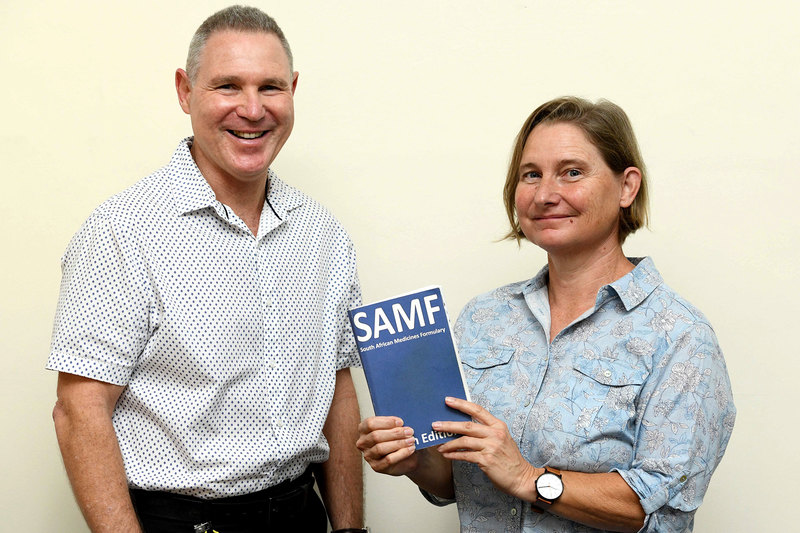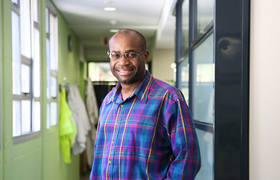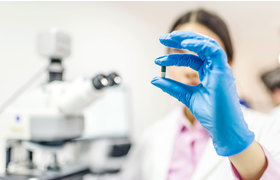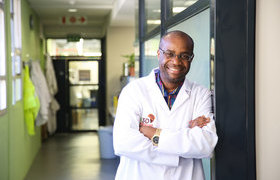Novel digital medicines information platform – a ‘game-changer’ for sector
24 February 2022 | Story Niémah Davids. Photo Nasief Manie. Read time 7 min.
In a ground-breaking move for South Africa’s healthcare sector, the South African Medicines Formulary (SAMF) – the gold standard for medicine information in the country – has gone digital. The SAMF website and mobile application (app) have been designed to keep up with the modern technology-driven world, streamline its service offering and extend its reach beyond South Africa’s borders.
The SAMF is an initiative of the University of Cape Town’s (UCT) Division of Clinical Pharmacology based in the Department of Medicine in the Faculty of Health Sciences. The book, published in hard copy for more than three decades, is considered the holy grail for clinicians. It contains a plethora of medicine information, which includes detailed explanations on what certain medicines can be used for and not, as well as the required dosage for different patients.
A mammoth project
For those SAMF loyalists, who have long been using hard copies of this medicines guideline, the digital platforms have not replaced the book – not yet at least. Instead, the app and website have been described as extensions of the book and have been developed to provide users with on-the-go access to the information they need in real time.
“It’s an absolutely wonderful initiative that is guaranteed to benefit hundreds of thousands of doctors and pharmacists in South Africa, on the continent and around the globe.”
The mammoth project has been in the works for the past two years and is carried out in partnership with UCT’s Research Contracts and Innovation (RC&I) office; Aviro Health (the team of developers); and the South African Medical Association (SAMA).
“It’s an absolutely wonderful initiative that is guaranteed to benefit hundreds of thousands of doctors and pharmacists in South Africa, on the continent and around the globe. After 33 years, there’s no need to haul out the book anymore. The information you need is right on your phone,” said Professor Marc Blockman, SAMF managing editor and the director of UCT’s Medicines Information Centre (MIC).
Valuable resource
Typically, medical and pharmacy students are introduced to the SAMF relatively early on in their studies, and the resource acts as a go-to guide during their rotations and long after they graduate and move on to become doctors and pharmacists.
The SAMF has been described as “incredibly valuable” and multifaceted. It’s completely independent and impartial, and in no way linked to the pharmaceutical industry. Like the book, the app and website are divided into sections and each section contains comprehensive information and guidelines on how to manage conditions like tuberculosis (TB), hypertension, benign prostatic hyperplasia, and even how best to treat cases of poisoning. In addition, the resource also incorporates detailed information on how to help clinicians prescribe safely in certain high-risk groups like children, as well as in patients with liver and renal failure.
But that’s not all. The app also boasts a novel voice search feature. This means that users can request the information they need by speaking directly into a built-in microphone. The feature is especially useful to doctors during ward rounds. One striking difference between the book and the digital platforms is the latter will be updated every six months to remain relevant, while the book is updated and published every two years.
The nitty gritty
Professor Blockman said a beta testing version of the app was launched last year and users were invited to use and test it free of charge and provide suggestions and recommendations on how to improve the platform. He said thousands of people signed up to use the app during the beta testing stage – one of the final steps of software development before a product goes live. Subsequently, in August 2021, during a dark launch, the app was added to Google Play and the App Store. The app costs R79.99 per month and R809.99 per year. Currently, 250 “by chance” paid users have already downloaded the app.
“We want to see it fly across Africa and beyond our continent’s borders. The potential is enormous.”
“Because it’s a paid-for service, we wanted to make 100% sure that everything worked the way it should before we officially launched the product. And aside for a few teething problems, which we are working hard to resolve, we are well on our way,” he said.
Purchasing a subscription on Google Play or the App Store means users automatically gain access to the SAMF website. One subscription allows users to access the app on three devices simultaneously – a mobile phone, tablet and laptop. Currently, clinicians from Namibia, Botswana and the United States have already bought the app and this number is expected to increase exponentially in the coming months.
“We want to see it fly across Africa and beyond our continent’s borders. The potential is enormous; there are thousands of South African doctors and pharmacists all over the world who grew up with SAMF. Now they can access it wherever they are,” Blockman said.
Ploughing back
Blockman said one of the primary aims with both digital platforms is to get large private hospital and pharmacy groups on board at a reduced rate, with the hopes of increasing efficiency within their organisations and streamlining their overall health service offering.
“We want to create a sustainable income stream so that we can keep providing this unbiased medicine information offering for generations to come.”
Further, the success of this digital project also means that the MIC can continue its essential work – providing updated unbiased medicine information to those who need it. The centre is based in the Division of Clinical Pharmacology and provides healthcare workers with up to date, well-researched and free drug information. The MIC also runs the National HIV and TB Health Care Worker Hotline, which is available to all healthcare workers in South Africa, and to remain on track, the centre regularly receives input from a multidisciplinary team of health professionals within the university community.
“We want to create this sustainable income stream so that we can keep providing this unbiased medicine information offering for generations to come,” Blockman said.
 This work is licensed under a Creative Commons Attribution-NoDerivatives 4.0 International License.
This work is licensed under a Creative Commons Attribution-NoDerivatives 4.0 International License.
Please view the republishing articles page for more information.










